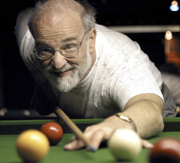 Professor Peter Grogono indulges
in a little snooker at Sharx pool room. “A computer simulation of
snooker is an interesting example of a complex system with emergent properties:
the positions of the balls on the table reflect the simulated ‘skill’
of the player, just as in a real game.”
Professor Peter Grogono indulges
in a little snooker at Sharx pool room. “A computer simulation of
snooker is an interesting example of a complex system with emergent properties:
the positions of the balls on the table reflect the simulated ‘skill’
of the player, just as in a real game.”
Photo Andrew Dobrowolskyj
|
by James Martin
In cases of emergence, break rules. That was the unofficial mantra of
Biological Framings of Problems in Computing, a recent meeting of the
minds at the Santa Fe Institute.
“Much of what we were doing was taking a central idea in computer
science and just throwing it out the window,” said Peter Grogono,
an associate professor of computer science at Concordia who participated
by invitation in the thinkgroup.
The mid-April workshop was the first major meeting of the Feyerabend Project,
named for the late Austrian philosopher who speculated that new scientific
theories do not, as is conventionally believed, necessarily improve upon
previous theories.
By entertaining the “quite radical” notion that certain supposedly
inarguable points (e.g. the idea that all computer data must have an address
in order to be accessed) are incorrect, the Feyerabend Project hopes to
shrink the huge developmental gap between computer hardware (which, due
mainly to manufacturing innovations, keeps getting smaller, lighter and
faster) and software (largely unchanged since the 1970s).
Although the problem is specific to computer science, the Santa Fe meeting
turned to all forms of complex systems (namely, any system with many interacting
parts) for possible insight. Grogono was one of 15 computer scientists
invited to the workshop, with the other 10 participants (including Concordia
assistant professor of electrical engineering Nawwaf Kharma) coming from
a wide range of disciplines.
“There were biologists, economists, and people who look into weather
forecasting,” Grogono explained. “When you get deeply into a
field like computer science, you absorb all the ideas in that field. In
one sense, that’s obviously a good thing, but it can also hold you
up because you can’t escape those boundaries. So if you start giving
up the key assumptions, you may get nowhere, but you may see things that
people haven’t seen before.
“That’s why you often find that people coming from another field
make contributions, because they don’t have all the baggage. You
find this particularly in computer science, where often the advances are
made by physicists, doctors, biologists, and people like that. They may
make mistakes, but they can also bring important insights.”
Grogono noted that biology has been particularly useful in rethinking
computer science, and researchers are currently looking into possible
links between virology and computer virus protection. Even the lowly ant
has proved a source of inspiration with regard to “emergence”
theory, which is widely tipped to take software development to the next
level.
A hot topic at the Santa Fe workshop, and certain to be much discussed
at the upcoming Feyerabend Project meeting in Oregon, emergence is basically
a reversal of the traditional top-down approach to software design.
“Emergence is a ‘bottom-up’ approach,” Grogono explained.
“Modern software is written to handle the global situation, which
is often why it’s so complicated: it has to take into account so
many possibilities. “Whereas if you can get the local control correct,
the emergent phenomenon is that globally, things will work out all right.
At least that’s the idea.”
In other words, although your average ant is, well, a one-track simpleton,
ant colonies are collectively capable of creating and maintaining extremely
complex systems.
A snooker enthusiast, Grogono has written a popular online simulation
as an example of a complex system with emergent properties. He noted that
other computer games, particularly the wildly addictive The Sims, show
emergence theory in action.
He’s currently writing system simulations in order to better study
emergent behaviour, and says there are close similarities between his
simulations and The Sims — “but my simulations don’t look
as exciting.” Nevertheless, Grogono has made an effort not to become
overly familiar with his kindred pop-culture spirits.
“I’m scared that if I got hooked on The Sims,” he confessed,
“I might never get anything else done!”
|
|
|




